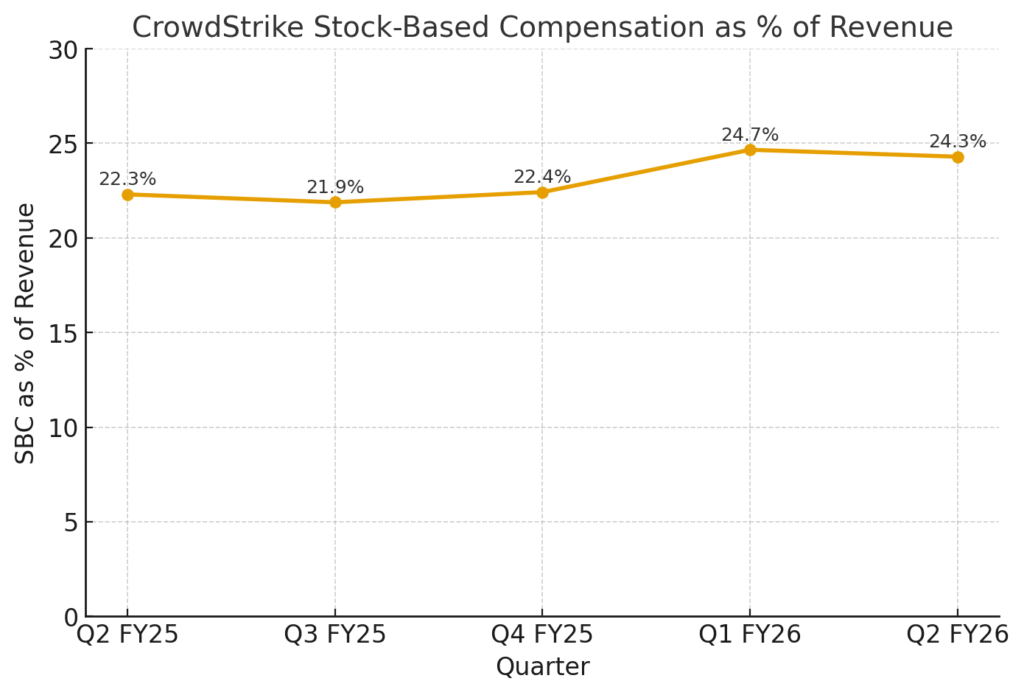CrowdStrike (CRWD) Revenue Tops Expectations but Margins Disappoint
CrowdStrike (CRWD) reported Q2 FY26 results with revenue up 21% year over year to $1.17B and net new ARR of $221M, both ahead of expectations, but the stock fell about 4% in overnight trading as investors focused on a swing to a GAAP net loss, rising stock-based compensation, and margin pressure despite strong top-line growth.
Earnings Results
- Revenue: $1.17B, up 21% YoY (beat expectations).
- Subscription Revenue: $1.10B, up 20% YoY.
- ARR: $4.66B, up 20% YoY, with net new ARR of $221M (ahead of expectations).
- Non-GAAP EPS: $0.93 vs. $0.88 last year (record high).
- GAAP EPS: loss of ($0.31) vs. profit of $0.19 last year, due to higher stock comp, incident costs, and strategic plan charges.
- Cash Flow: FCF $284M (up modestly from $272M).
Guidance
- Q3 FY26 revenue: $1.21B–$1.22B
- Non-GAAP EPS: $0.93–$0.95
- Full-year FY26 revenue: $4.75B–$4.81B
- Full-year Non-GAAP EPS: $3.60–$3.72
This was slightly above prior guidance, but not a big raise.
Operational Highlights
- Gross margin dipped:
- GAAP subscription gross margin 77% vs. 78% last year.
- Non-GAAP subscription gross margin 80% vs. 81%.
- Large GAAP loss: driven by $284M stock-based comp, $35M July 19 incident costs, and $38M in “strategic plan” charges.
- Free cash flow margin fell to 24% vs. 28% a year ago.
- Announced acquisition of Onum Technology.
Why Stock Reacted Negatively
- GAAP Loss & Higher Costs
- Despite strong revenue and ARR, GAAP results swung to a $77.7M loss from a $47M profit last year.
- Investors focused on rising expenses: sales & marketing +26% YoY, R&D +38%, G&A +67%.
- Margins Compression
- Gross margin slipped, and free cash flow margin declined from 28% to 24%.
- Signals higher costs to sustain growth.
- Muted Guidance Raise
- Management beat expectations in Q2 but raised full-year guidance only slightly, suggesting limited near-term acceleration.
- Lingering “July 19 Incident” Costs
- Ongoing costs tied to last year’s sensor crash remain a drag, raising concerns about execution risk.
CrowdStrike’s stock-based compensation (SBC) as a % of revenue:

- It has climbed from around 22% in Q2 FY25 to nearly 24% in Q2 FY26.
- The ratio has stayed elevated quarter after quarter, even as revenue grows.
- This level is well above peers, which usually range closer to 10–15%.
The trend confirms that SBC is a structural profitability drag and a key reason GAAP losses are widening.
Key Technical Summary
| Indicator | Signal |
|---|---|
| Short-Term Moving Averages | Strong Sell |
| Long-Term (200-day MA) | Modestly supportive (Buy) |
| RSI | Neutral |
| MACD | Slightly mixed/bullish |
| Pattern (Bear Flag) | Negative outlook |
| Accumulation | Weak (E rating) |
| Relative Strength | Moderate (RS = 75) |
What This Means
- Short-term momentum looks shaky: the stock is below most key moving averages and showing a bear-leaning pattern.
- There’s a risk of further downside, especially if volume confirms continued selling.
- A stabilizing element is that CRWD remains above its 200-day average—suggesting some longer-term support is holding.
- Watch closely for a bounce off the $410–$421 support zone. A drop below that could signal deeper weakness.
- Conversely, overcoming resistance levels (like the 50-day MA) with strength and volume could help reverse the tone.
Context vs. Peers
- CrowdStrike is still growing faster than legacy peers (like $PANW, $FTNT), but margins are under pressure unlike Palo Alto, which recently emphasized operating leverage.
- Investors may be rotating to names showing both growth and expanding margins.
Takeaway:
CrowdStrike’s fundamentals remain solid, with strong ARR growth and customer adoption. But investors punished the stock because higher expenses, margin compression, and lingering one-off costs offset the headline beats. Guidance was good, not great—so the stock sold off on valuation and profitability concerns.
